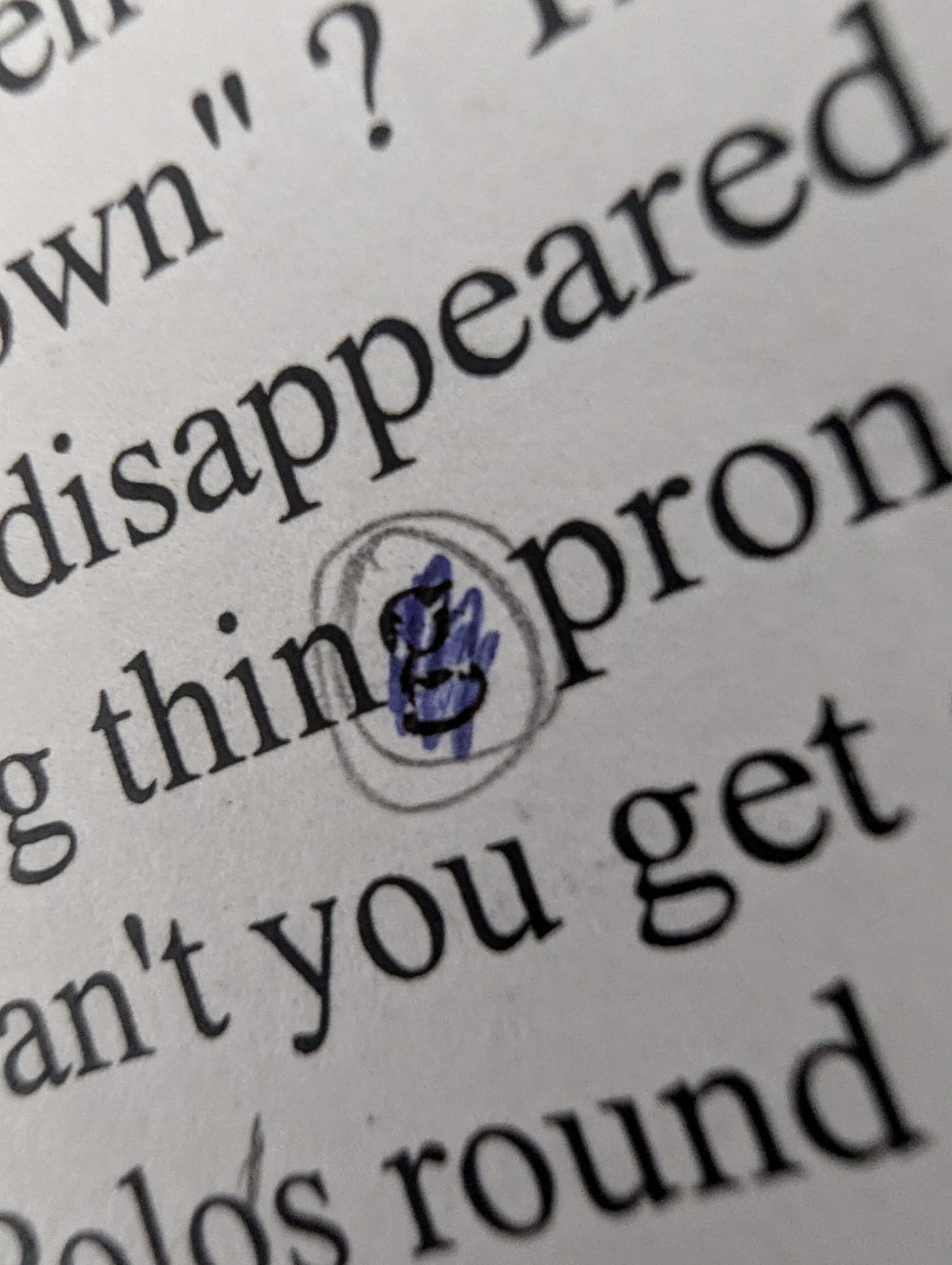I don’t know how long Frank sat there, in a box by the window at the back of the shop. The way I remember it, he was illuminated by a sunbeam – but I very much doubt that’s true. It was the first sunny Saturday of the year and I was in an antiques shop called Memories. The stuff inside was the usual bric, the expected brac – figurines, coins, a mug marked BEEF DRIPPING. Frank was different. “Frank’s Memories” was (and is) a 22-page A4 booklet, bound at the side, glossy on the front, written by F. Saunders.
“In the summer of 1930, two people met for the first time,” Frank’s Memories begin. Spanning from his parents’ first meeting to his mother’s death in 1999, the booklet is stuffed with lives. When I took it to the counter and asked how much it cost, the woman said £1.
I’ve owned Frank’s memories for four months and I must’ve rested a drink on them at some point because there’s now a circular watermark on the front. It’d be very easy – if I hadn’t just said that – to forcefully push my words about Frank towards profundity, to select the right quotes to leave you feeling if not teary, then at least a little bit tingly.
When Frank’s dad fell ill in 1961, his mother smuggled a little black poodle named “Pepe” into the hospital. She hid him inside a carrier bag.
It’s harder – perhaps even pointless – to admit that at times Frank’s memories bored me, or made me laugh for the wrong reasons. If that’s what I’m going to take away, why didn’t I just leave them in the shop? Or under my cup?
The Waiting Room is free to read. If you enjoy this newsletter, please consider leaving me a tip!
Frank’s parents met at a pub named The Swan – his dad was a 20-year-old soldier and his mum was “just fifteen”. She worked in a toffee factory, two words so evocative that they make my ears twitch. It’s clear after just a couple of pages that Frank is passionate about geographical accuracy – “the street had its own pub, situated at the far end, on the corner of a junction with Church street, which ran roughly in a north/south direction” – but he can’t map everything. His parents wed in 1930 and “sadly” the marriage was “in trouble” by 1936. His mother left his father – Frank doesn’t tell us why, instead deciding to focus on her new address.
In the span of a sentence, Frank’s parents reunite, and we learn that he was born on 24th June 1943. He was a breech birth, which caused his mother to remark, long afterwards: “He arrived the wrong way round and he’s been trouble ever since!”. Frank’s first memory – the first that is his very own – is of picking potatoes and cabbages from nearby fields, aged two.
Frank recalls Queen Elizabeth II’s coronation in 1953 – but not much about it, beyond the communal roasting of an ox. He better remembers the thrill of seeing a teacher outside of school; a wink shared in a church. He is proud that his mum cooked stew for hungry neighbours. He was nearly top of his class in German, once.

In 1959, Frank took his first job at a supermarket – his manager was called Mr. Sales and it’s impossible not to love that. The main attraction of the shop was 2lb bags of sugar sold very cheap. In his booklet, Frank has included a picture of his younger self in his uniform – he wore a bow tie and his hair parted smartly on the lefthand side.
When Frank “discovered the joys of drink”, he swung round and round and round a lamppost outside the pub. “Of course I was sick, but found myself doing the same thing the next week.” Once, he and two friends drank a bottle of apricot brandy and decided to roll down some stairs.
Reading Frank’s words starts to feel like sitting in a squishy armchair, half-listening to memories spoken aloud. “Jonesy was the best ‘puller’ of birds in our bunch…”
On the next page, a blue pen has corrected a lowercase ‘h’ at the start of a sentence – it’s ‘H’ now. Did Frank do it? Why? Where did he hope these memories would end up? Why did he have them printed and bound? Later in the booklet, a few sporadic pencil markings join the blue pen. Did someone else proofread this? Did they donate it to the shop, or did Frank?
In the late 60s, Frank decided to become self-employed; he bought a van from which to sell fruit and veg. One customer tried to steal some cherries and he yelled in her ear that he hoped she’d choke. Another customer slit her own throat after her husband died.
There’s an arrogance in what I’m doing here – chopping and rearranging Frank’s story so it makes the most impact. I am the fruit thief. I’m cherry-picking the most interesting bits of his life, making sure to include the words that most move me: toffee factory, Pepe, slit throat. I’m ignoring the names of so many other dogs! I’ve left out Frank’s love of motorcycles because the numbers of the models make my eyes blur. Frank’s not problematic in my telling – and truthfully, he’s not too problematic in his own – but there are a couple of observations I’ve left unobserved.
I’d hate if someone did this to me: I cannot be reduced!!! Why am I even writing about Frank’s life? It doesn’t feel especially ethical (though apart from Mr. Sales and Pepe, I’ve changed all names, plus Frank’s birthdate). Truthfully, I probably imagined I’d get more from this booklet when I parted with my pound. I think, when I bought it, that I already knew I would write this newsletter – I already knew I’d steal Frank’s story and make it my own. Why? Probably because I want you to tell me I’m a good writer. Did Frank want the same? Or was the writing itself secondary, just a means to get his life recorded?
I am a huge fan of personal histories – I think they’re the only real history we have. I don’t actually think that AT ALL, but I think that sentence sounds good and I can’t be bothered to correct it with a blue pen. Still, it’s true that I love to read about people’s lives; I adore the way huge hunks of history can be stored in tiny encounters. Like when Frank met his stepdad for the first time (sorry for glossing over his dad’s death), and “he was a generous man” who gave him “a lovely old tankard engraved with Dickens characters.”
That sentence is so wonderful because it’s so dateable – it would mean something very different if the gift was given 1890, and you probably wouldn’t rate your stepdad if he gave you a Dickens cup in 2024.
Frank once knew a barman with only one tooth.
He joked to him: “Can’t you get shot of that one too?”
The barman replied: “I’ve got to keep that one to swing my Polos on!”
Frank, I think, never married – but towards the end of his booklet, he oddly slips into plural pronouns: “we” loved our caravan, “we” became buddies with Larry and Maude. Possibly he’s talking about his dog and two cats, or his siblings and nieces. In 1997, he became “great friends” with a woman named Olive. He reveals this at the very top of the very last page of the booklet, so I cannot know what happened next.
There’s supposed to be a point at the end of articles like this one. I hate that. After all – and I don’t mean this in a cruel way, though it’s hard in our era of Disneyfied tales for it not to sound mean – there wasn’t a point at the end of Frank’s life. He was only 57 when he wrote down his memories in July 2000; he ends the booklet with his mum’s sudden death in August 1999. He’d only be 81 now; perhaps his life isn’t over at all.
Frank doesn’t bother to tell us why he’s written his memories down – was he helping a relative with a school project? Was he suddenly struck, as he approached the anniversary of his mother’s death, by the need to leave a record behind? Or did he just do it because we seemingly all do it – on Instagram, in photo-booths, inside diaries, atop our skin with tattoos? We can’t help it. We love to tell stories about ourselves.
I can’t find a trace of Frank and his relatives online – if it weren’t for the photographs in the booklet, I might start to suspect he made it all up. Perhaps he changed people’s names as he was writing, and it was therefore needless for me to change names too. Or perhaps if I spent another hour or two properly diving into the depths of Google, I would find him, or a living relative, and be able to call them up. But although I feel a twinging, guilty need to reunite Frank (or his relatives) with this book, I can’t deny that ultimately I’m relieved I couldn’t find them when I looked – it left me free to tell the story how I see fit, my fingertips stained with stolen cherry juice.
Of course it would be nice if someone out there could answer some of my questions – but truthfully, questions are often far more satisfying than answers. Why did Frank end his memoirs in 1999? Because he was going to kill himself! Because the millennium bug wiped his computer! Because everything has to end and you don’t have to find meaning when it does!
The Waiting Room is free to read. I know you’re supposed to ask for paid subscriptions on Substack, but I don’t like the idea of charging people when I can’t guarantee you’ll like what you get. This newsletter runs on a “pay what you feel” model — if you enjoy an issue, you can send me a tip via www.paypal.me/AmeliaTait. Thank you!





I’ve been thinking a lot recently about how every piece of writing (or story) is basically a regurgitation of something that already exists, but like to think is no less valuable for it. This was a particularly enjoyable one to read!
This was so interesting I love when you pass by an antique shop and there are tables of photographs outside. Just photos of ordinary people doing ordinary things. It always makes me wonder who they are and how their private memories ended up here.